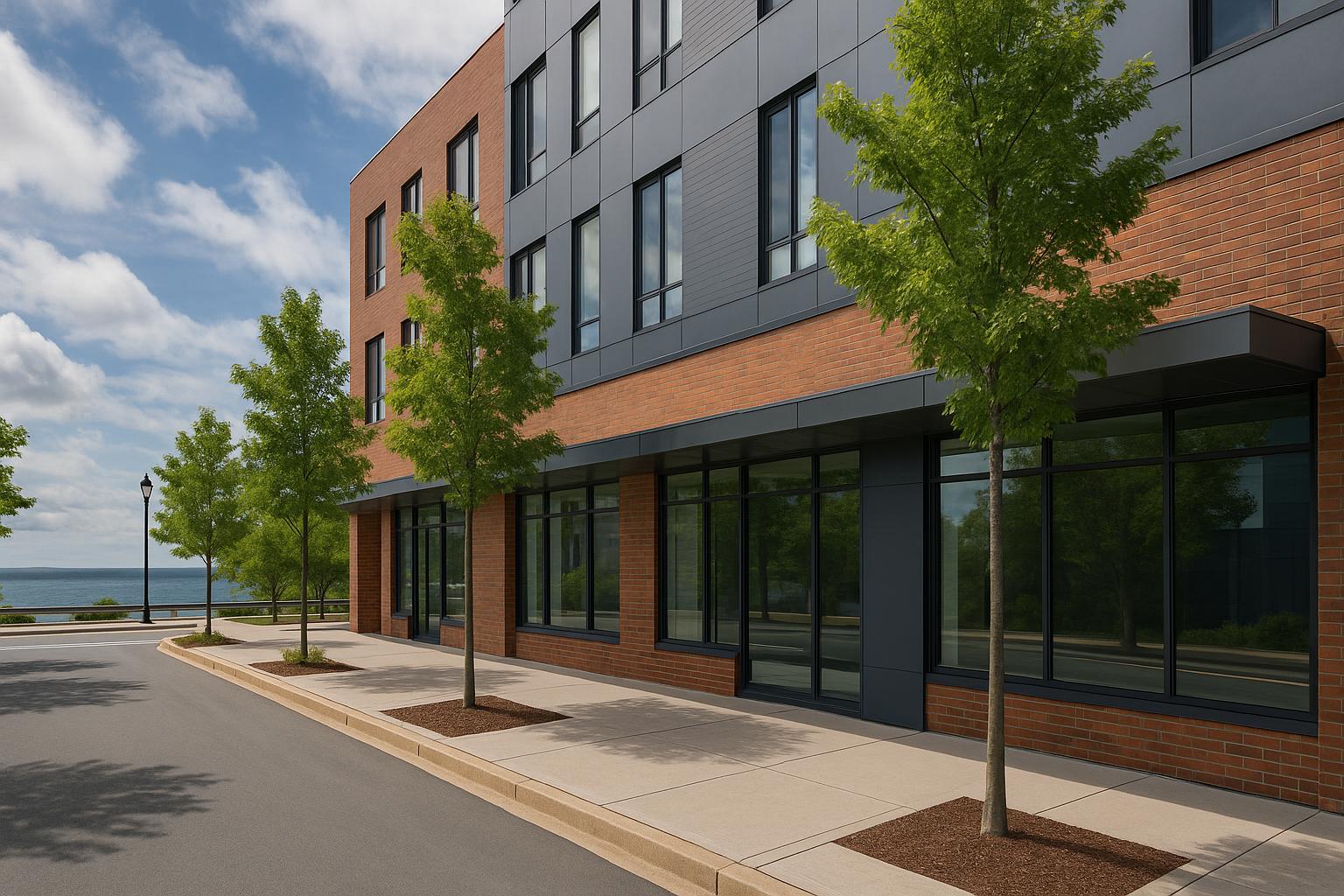In Halifax, new planning rules now eliminate mandatory on-site parking for residential buildings within the urban service area, making it easier for property owners to build apartments. This change, effective December 31, 2024, removes a common barrier for small urban lots, allowing more space for housing instead of parking. If your property is in the urban service area, you can automatically bypass parking requirements and focus on multi-unit development.
Key Points:
- Parking waiver policy: No on-site parking required for residential buildings in Halifax's urban service area.
- Benefits: More space for housing, reduced construction costs, and faster approvals.
- Eligibility: Check if your lot is in the urban service area and meets zoning and infrastructure standards.
- Steps to start: Confirm eligibility, consult Halifax planning staff, and work with an experienced builder.
This policy shift addresses the housing shortage while simplifying the development process for property owners.
110-112 Portland Street , Downtown Dartmouth, Nova Scotia/ Development Opportunity
Halifax Parking Waiver Rules and Requirements
Halifax has recently updated its planning rules, creating more opportunities for urban infill development. Below, you'll find the key details on the requirements, who qualifies, and the latest changes to these rules.
Standard Parking Requirements for Apartment Buildings
In the past, Halifax required every apartment unit to include on-site parking, which often took up valuable space on smaller lots. However, a major shift in policy now changes this. As of December 31, 2024, the municipal planning strategy states that "no requirement for on-site parking applies to residential uses within the urban service area" [2]. This change represents a new approach to parking regulations, aimed at making urban residential development more feasible.
Who Can Apply for Parking Waivers
If you're a property owner developing residential projects within Halifax's "urban service area", you're automatically exempt from the on-site parking requirement [2]. To confirm your eligibility, check Appendix B of the Minimum Planning Requirements Regulations. It's also a good idea to contact Halifax's planning department to verify your property's status and explore any other options that may be available.
Recent Changes to Halifax Planning Rules
The updated rule eliminating mandatory on-site parking for residential uses in the urban service area officially took effect on December 31, 2024 [2]. This gives property owners more flexibility to build multi-unit housing on smaller, underutilized lots. For properties outside the urban service area, there’s an alternative option: owners may pay a fee instead of providing physical parking spaces [2]. These updates aim to simplify the process of developing apartments on lots that might otherwise have been overlooked.
How to Apply for a Halifax Parking Waiver
If you're considering applying for a Halifax parking waiver, the process begins with reaching out to Halifax planning staff. This step is essential for understanding the specific requirements and procedures involved. It also opens the door for a more detailed conversation about your project.
Meeting with Halifax Planning Staff
Set up a meeting with a planning representative to get a clear picture of the process. During this meeting, be ready to share details about your property, such as its location and size, as well as a brief description of your proposed project. This discussion will help determine if your property fits within the urban service area guidelines and flag any additional factors you may need to address.
Preparing Documents and Submitting Your Application
You'll need to prepare a site plan and a concise summary explaining how your project aligns with community planning goals. Include details like nearby transit options or local amenities to strengthen your case for reduced parking needs. Once your documents are ready, follow the planning department's instructions for submission.
Review Process and Approval Timeline
After submission, your application will go through a review process. Processing times have improved, but larger projects might require extra steps, such as public consultations or a review by the council. Planning staff may contact you for additional information, so staying responsive is key to keeping things on track. By following these steps, you can tap into Halifax's parking waiver system and make the most of your property's potential for multi-unit development.
sbb-itb-16b8a48
Why Parking Waivers Help Small Apartment Projects
Halifax's decision to remove minimum parking requirements has created new possibilities for property owners with smaller urban lots. Backed by $79 million from the federal government's Housing Accelerator Fund, these changes make building apartments a more appealing financial option [3].
Building More Units on Small Lots
Without the need for on-site parking, nearly all available lot space can now be used for residential units. This shift is particularly impactful in Halifax's ER-3 zones, where up to eight units - ranging from duplexes and townhomes to small apartments or condos - can fit on a single lot [3]. For property owners, this means they can add an extra rental unit, potentially generating monthly income between $1,950 and $2,100. This efficient use of space directly translates into better project returns.
Lower Construction Costs and Higher Returns
Parking waivers don’t just allow for more units; they also reduce the cost of construction. Skipping the expense of building parking can free up funds to create additional rental units. For example, Helio Urban Development offers fixed-price construction at $160,000 per unit. By reallocating parking-related savings, developers can add another unit and increase annual rental income by $23,400 to $25,200. This also contributes to the overall value of the property.
Faster Approvals with Less Paperwork
Beyond the financial and design advantages, parking waivers simplify the regulatory process. By removing the need for parking design reviews, approvals are faster, cutting administrative fees and avoiding delays. Halifax’s recent planning changes, introduced to accelerate housing development, aim to shorten these timelines. A 2022 independent Deloitte report highlighted these benefits [1]. For property owners partnering with integrated design-build companies, parking waivers minimize coordination issues, helping builders stick to efficient six-month construction timelines. This streamlined approach ensures projects move forward quickly and smoothly.
Can You Build Apartments on Your Halifax Lot? Quick Check
If you own property in Halifax, you might be able to build multi-unit apartments on your urban lot, especially if you take advantage of parking waivers. Here’s a quick breakdown of what you need to know to determine if your lot qualifies.
Basic Requirements for Halifax Apartment Construction
Before diving into construction plans, make sure your property meets the city’s zoning and infrastructure standards. Typically, your lot should:
- Be located in a zone that permits multi-unit residential buildings.
- Be large enough to support an apartment building.
- Have direct street access that accommodates emergency and service vehicles.
- Be connected to municipal water and sewer systems.
- Feature a manageable topography that doesn’t require major site preparation.
Depending on local regulations and heritage considerations, you may also need to decide whether to renovate, incorporate, or demolish any existing structures on the lot. If your lot has limitations, parking waivers can be a game-changer.
Using Parking Waivers to Maximise Your Lot’s Potential
Parking waivers allow you to bypass strict parking space requirements, freeing up more of your lot for the building itself. This can be especially useful on smaller or narrower urban lots, making it possible to design more rental units. Plus, it can improve the financial feasibility of your project by maximising the use of available space.
This added flexibility works well with a streamlined design-build approach, which can simplify the entire construction process.
Why Choose an Integrated Design-Build Company?
Traditional construction often involves juggling multiple contracts with planners, architects, engineers, and builders. This approach can drive up costs and stretch out timelines. Companies like Helio Urban Development offer a more streamlined alternative by bringing all these experts together under one roof.
Helio’s integrated process includes fixed-price construction at $160,000 per unit, with a guaranteed six-month completion timeline. If delays occur, penalties of up to $1,000 per day are applied. Their system also includes triple quality checks by engineers and daily real-time photo updates, giving property owners greater transparency and peace of mind.
For first-time apartment builders, this approach simplifies the process while delivering professional results. It’s designed to provide Halifax property owners with a reliable, efficient, and accountable way to bring their apartment projects to life.
Next Steps for Halifax Property Owners
If you're a property owner in Halifax looking to start an apartment construction project, there are a few key steps to help you navigate the process. Halifax's updated planning rules have made it easier to construct apartments, but success hinges on evaluating your property's eligibility and collaborating with the right builder. Here's how to get started:
Check Your Lot’s Eligibility for Apartment Construction
First, confirm if your property qualifies for apartment construction under Halifax's updated regulations. Use the official map in Appendix B of the Minimum Planning Requirements Regulations to verify whether your lot falls within Halifax's urban service area. Additionally, ensure your zoning permits residential use. Most zones now allow apartment development, except for areas designated for industrial, military, park, transportation reserve, utilities, environmental protection, water supply, or floodplains [2].
As stated in the regulations:
"provide that no requirement for on-site parking applies to residential uses within the urban service area" [2].
If you're able to begin construction before April 1, 2027, you could also benefit from relaxed rules concerning unit mix and ground floor commercial space requirements [2].
Once you've confirmed your lot's eligibility, the next step is finding the right builder to bring your project to life.
Select a Builder with Halifax Expertise
Choosing a builder familiar with Halifax's PPLC system and parking waiver applications is crucial. Look for a contractor who has a registered Contractor Profile in the PPLC system, can efficiently handle multiple permits, and understands the documentation standards required by municipal staff to avoid delays [4].
An integrated design-build approach can simplify the process by reducing the coordination challenges often seen in fragmented projects. For example, companies like Helio Urban Development manage everything from planning applications to construction, ensuring a smoother experience and clear accountability.
Kick-Start Your Apartment Project
Reach out to Halifax planning staff to discuss your property, zoning guidelines, and the application process. This initial conversation can help identify and address any issues before you invest in detailed planning [2]. Alternatively, you can consult an experienced apartment builder who can evaluate your lot and handle the entire development process for you.
With Halifax prioritizing solutions to the housing shortage, the city is encouraging a rapid increase in housing supply [2]. Thanks to parking waivers and streamlined zoning rules, there's no better time for property owners to seize the opportunity to develop apartments on urban lots.
FAQs
Is my Halifax property within the urban service area and eligible for a parking waiver?
If you're wondering whether your Halifax property falls within the urban service area and qualifies for a parking waiver, the best place to start is with the official boundary maps from Halifax Regional Municipality. You can easily find these maps on municipal platforms like the Shape Your City Halifax website. For more specific information about your property, you can also contact regional planning directly by emailing regionalplan@halifax.ca.
What financial advantages can a parking waiver offer when building multi-unit apartments in Halifax?
Using a parking waiver in Halifax can lead to substantial savings, as it removes or reduces the need to construct parking spaces - an expense that can reach up to $50,000 per space for property owners. By cutting down on these infrastructure costs, multi-unit apartment projects become more affordable and easier to finance.
Beyond cost savings, parking waivers can streamline the approval process and pave the way for higher-density developments. This means property owners can make more efficient use of their land, boosting the overall return on investment. At the same time, these waivers support the growth of urban infill projects, helping to make better use of existing urban spaces.
How can I apply for a parking waiver and build apartments on my Halifax lot?
To apply for a parking waiver and move forward with building apartments in Halifax, the first step is to familiarize yourself with the city’s zoning regulations. Pay special attention to the ER-3 update, which removes minimum parking requirements in urban areas. This will help you determine if your property is eligible for multi-unit development.
Once you’ve reviewed the rules, connect with Halifax’s Planning & Development department as early as possible. They can confirm your lot’s eligibility and provide a checklist of documents you’ll need. Your application should include detailed site plans and a well-crafted justification for the parking waiver, ensuring it aligns with local standards. Being proactive and thorough will simplify the process and increase the likelihood of approval.
Related Blog Posts
- Halifax’s New Zoning Rules Explained: Up to Four Units on a Single Lot (What It Means for Builders)
- Halifax Parking Requirements: Zero Minimums for Residential in Urban Service Area
- Parking Waiver Strategy in Halifax: Where “Zero Stalls” Works (ER-3/ER3, HR-1/HR1, COR)
- Do I Need Parking for a Small Apartment in Halifax? Builder’s Plain-English Answer



